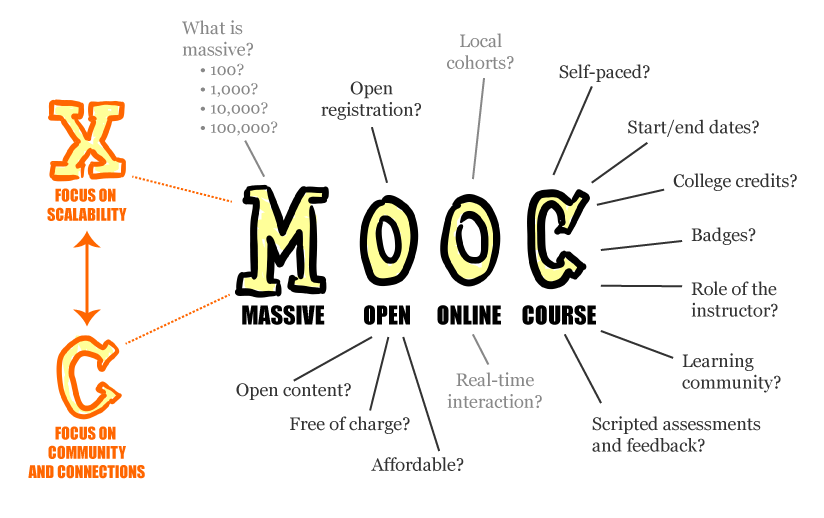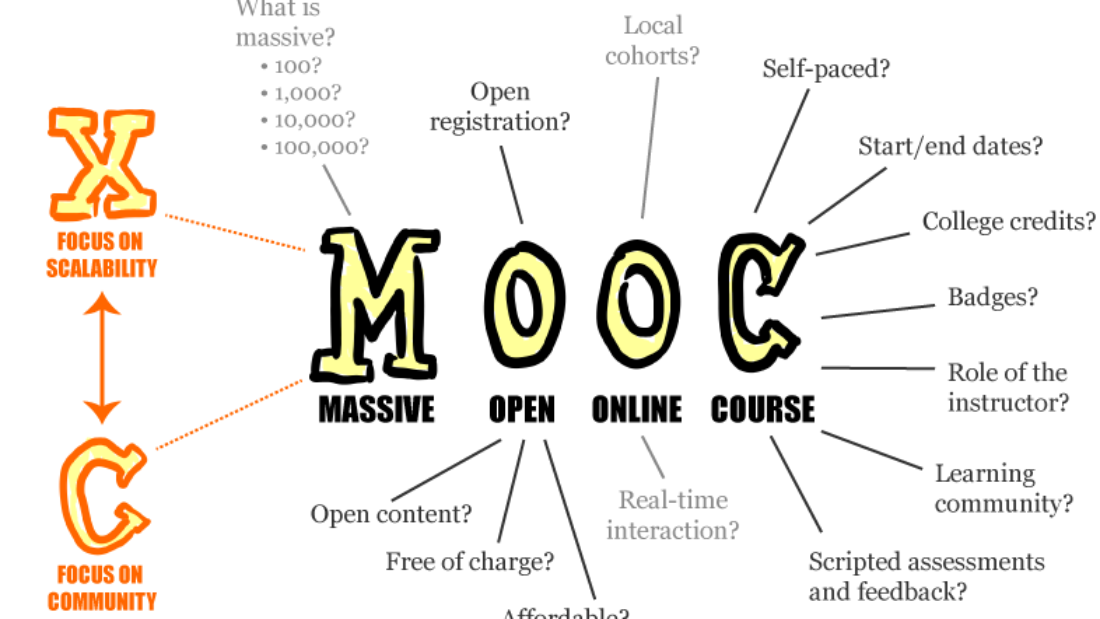
By Mathieu Plourde (Mathplourde on Flickr) – https://www.flickr.com/photos/mathplourde/8620174342/sizes/o/in/photostream/, CC BY 2.0, https://commons.wikimedia.org/w/index.php?curid=75937656
Oh, what a Pandora’s Box I opened when I decided to research online courses! Did you know that it is estimated that the e-learning/online course markets will be worth $325 billion by 2025? I had no idea of the extent and the availability of online courses.
I started with Coursera, as it had advertised its free course options after COVID19, but then found that Coursera is just one of the MANY available “online learning platforms” (OLPs) such as Skillshare; Linked In learning; Udemy, among others.
I didn’t even know that term, “online learning” before but, as I continued researching, I found that Coursera offered many diversified free courses, or MOOCs! MOOC stands for Massive Open Online Course.
There list of distance-learning MOOCs running worldwide is long.
You can study almost any subject through this method, and dozens of famous universities worldwide are now offering MOOCs.
With MOOCs, students have the option of studying a subject in depth without the restrictions of a traditional university course. They are open to anyone, regardless of whether they have studied before or not. The courses are self-paced and students can take as long as they want to complete them.
Besides MOOCs there are platforms that offer a combination of both free and priced courses.
Online learning platforms are not just about receiving lessons, but also offering them. There are platforms which enable people to design their own courses and sell them to students or teach them to students online. In many cases, the cost runs in the $20.00 range or less.
In addition to OLPs, there are online course platforms (OCPs) that offer live educational programs and connect students with instructors directly. In this case, providers offer access to digital classes which are comparable to offline courses, with an instructor who teaches on video, image, text, audio and PDF files. Students follow, take notes, perform exercises and complete exams. Online Course Platforms include Thinkific; Teachable; Learnworlds; Kajabi; Learn Dash; Podia; Ruzuku; Academy of Mine; Wiziq.
What makes online learning interesting is that:
1) you can learn whenever you want, as there are no scheduled class times;
2) you can learn pretty much any subject or topic;
3) they are often free or less expensive than actual courses offered in institutions;
4) they are self-paced and accommodate differences in learning speed;
5) they can be used anywhere regardless of physical and geographical limitations.
There are many variables to consider when selecting online courses.
The most important variable is the price. OLPs can cost anywhere from free, $12.00 – $300.00 and much higher (for example if one takes a class in MIT!).
Another important variable is the type of course you are looking for. Do you want to receive credits and a certificate for the course, or do you simply want to audit it? Do you want factual academic programs of study which can range from Engineering through Psychology and Humanities to Literature? Or do you want to learn a skill, hands on/technical courses? How about a course on Covid-19? How about a virtual happy hour?
Because our aim was to find the most accessible courses that can be offered through Media Spa in the engAGE Living Lab, I decided to limit my search to free courses, which do not earn credits or degrees/diplomas as they can also be found on platforms with credit courses that carry a cost and credits.
There are many “lists” whose websites I will include: “a critical review of some distance-learning courses”; 25 Killer Sites for Free Online Education” and “Elite universities offering online courses”.
So, let’s open Pandora’s Box and get on with it!. Below, I list such platforms, along with some comparisons among the platforms and include some interesting courses on each platform, if available.
Top 10 Best Sites for free Online Education (Updated – March 25, 2020)
Coursera.org– One of the leading providers of MOOCs. It partners with universities and organizations around the world. Wide range of in-depth courses are freely available, for example Stanford Introduction to Food Health; Introduction to Psychology (Yale); Digital Marketing (U of Illinois); Strategic Business Management – Microeconomics (U of California); International Organizations Management (U of Geneva), etc.
These courses have a structured classroom style of learning.
EdX.org – More than 2500 online courses from 140 leading institutions worldwide are offered. Full MOOCs with teachers, discussion boards, quizzes, etc. EdX focusses on, and excels at, Math, Natural Science and Engineering. It also includes Economics, Finance, Film, Literature, Media, Philosophy, Psychology, and more.
KhanAcademy.org –Is partnered with post-secondary schools, is officially recognized by College Board SAT and teaches at more basic levels but does not offer any certificates. Short lectures cover many different subjects including Math, Science, Computers, Arts, Humanities, Test Prep (SAT, LSAT, etc.). They teach a handful of information at a time which builds on each other as the course progresses.
(When I was working in a high school, I often had students use Khan Academy for extra help with a subject. But it is also good for adults who want to learn about any of their subjects.)
Udemy.com – Free (Premium) and paid skill courses but the paid ones are not expensive. Online training platform offers 130,000 courses including Cooking; iOS SDK 7 Bootcamp (free); Complete Machine Learning Master Class ($150); How to Make a Real Estate Website with WordPress($24). MOOCs are taught by leading experts in their fields. These are many free courses, like Coursera, with top quality content. They offer no accreditation.
Open University (available through iTuneU) Has been around since 50 years ago. Based in the UK, and extending 147 countries, this platform offeres accreditation, but they also have free courses which can be accessed through iTuneU.
MIT Open Course Ware – Provides lectures, lecture notes, home assignments, sample tests and other materials from actual MIT courses. Best for science, computers and engineering topics but also includes Accounting; Healthcare Management; Game Design; Visual Arts; Legal Studies, Religion; Psychology and more.
Stanford OnLine – Self-paced programs of study. World class courses but they are expensive and the free choices are somewhat limited. Many of their free courses are offered through edX and Coursera.
Codecademy.com –Specifically teaches computer programming, for example coding to develop interactive websites using the most useful languages. This is done in the browser using interactive tools. Lessons are in complete modules with the ability to monitor your progress. Prices include Free, for 180 hours of lessons, or ~$20/month for 1800 hours of formal training that can be applied in the job market.
Open Culture OnLine – This platform is full of educational and cultural media content (including films and music) with more than 1000 lectures, video podcasts from universities around the world. Features a lot of material found only on universities’ private websites, easy to browse. Helpful to find many courses in one area of study without going to each university’s website. Courses in Languages, Philosophy; Environment, Economics, Math, Computers, etc.
Ted Ed – Educational videos – 10 minutes long, or less, which also include supplemental materials and quizzes on the videos. Courses include: Corona Virus; What is Schizophrenia; What Almost Dying Taught Me About Living; Teach Girls about Bravery, not Perfection; Rasputin; and many more.
Additional websites for free courses
Udacity.com 200 MOOCS, self-paced courses. Heavy focus on computer science, vocational education. Popular courses include Artificial Intelligence; Programming Languages; Applied Cryptography; Introduction to the Design of Everyday Things; Refresh your Resume. Courses designed by experienced professionals or professors.
Linkedin Online-Training (formerly called Lynda) Courses are geared towards career development and include Software development, Facebook Development, Managing your Time, Body Language for Leaders, Critical Thinking, Photography, Data Science and Analytics, etc.
FutureLearn.com – Partners with university and industry professionals. Excellent platform for self-learning courses. Pre-recorded video lectures and readings. Work at your own pace. Student discussions on every page; some have online practical quizzes, homework assignments. Interesting courses include Understanding Anxiety, Depression and CBT (Cognitive Behavior Therapy); Introduction to Screen Writing; Causes of Climate Change; Culture and Tourism.
Masterclass.com Courses taught by experts or celebrities on how to act, how to create etc. Do not provide practical skills. World class video production. Closer to a documentary or entertainment presentation. For people looking for inspiration; students can work at their own pace. Individual classes $90. each. All Access Plan $180./year unlimited use. Course types include Film and TV; Culinary Arts; Sports and Games; Music and Entertainment; Business Photography and Fashion.
Corporate Financing Institute— Certified programs like Corporate Finance; Introduction to Derivatives; Excel Crash Course; Reading Financial Statements, etc. But they also offer free courses that you can browse at the link provided here.
LifeStyle at Alison.com– Not accredited, free with a slight fee for companies. Lifestyle type courses: Food Safety; Digital Photographer; Fashion Design; Makeup Artistry; Plumbing, Electric Wiring; Languages; Information Technology; Business/Math; Science Health, etc.
Skillshare.comis not an OLP but an online learning community with thousands of classes for creative and curious people”. Courses include: Art and Science of Drawing; Going Freelance: Building and Branding Your Own Success; Building an Etsy Shop that Sells: Strategies for Ecommerce Success; Introduction to Social Media Advertising/ Learn with Buffer; Create a Perfect Morning Routine, and many more.
Academic Earth.org– Offers free online academic college courses, undergrad and graduate, from the world’s top universities including MIT, Berkley; Stanford, etc. Also includes Test Prep for SAT, GMAT, LSAT and more. Courses include Economics of Education; Measurement in Education and Social Science; Social Organization; Media, Education and the Marketplace; Computer Games for Investigation and Education.
Phew! Should I go on or is this enough? There are other sites, not as well known and probably not as useful that I have not included. For example
Lyonwinetasting.com–Virtual Happy Hour, offers courses in wine tasting!
And the list seems to change and grow rapidly. But I think/hope you have enough to begin with on your journey through the confusing world of online learning. Have a good cyber trip, it’s the only kind we can go on for now!


